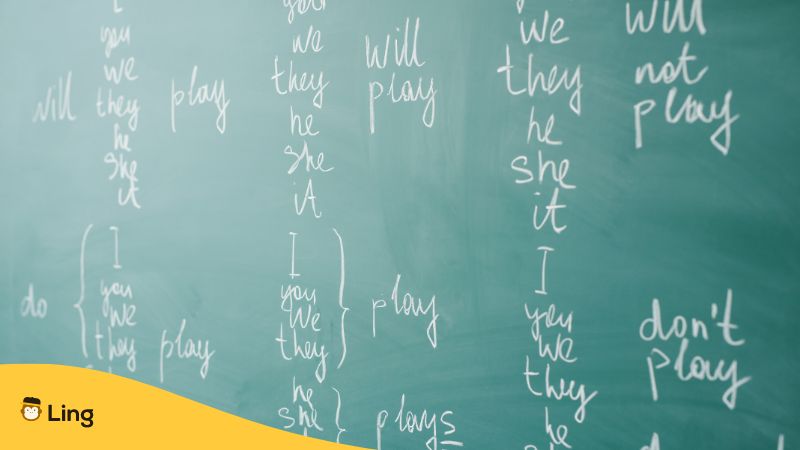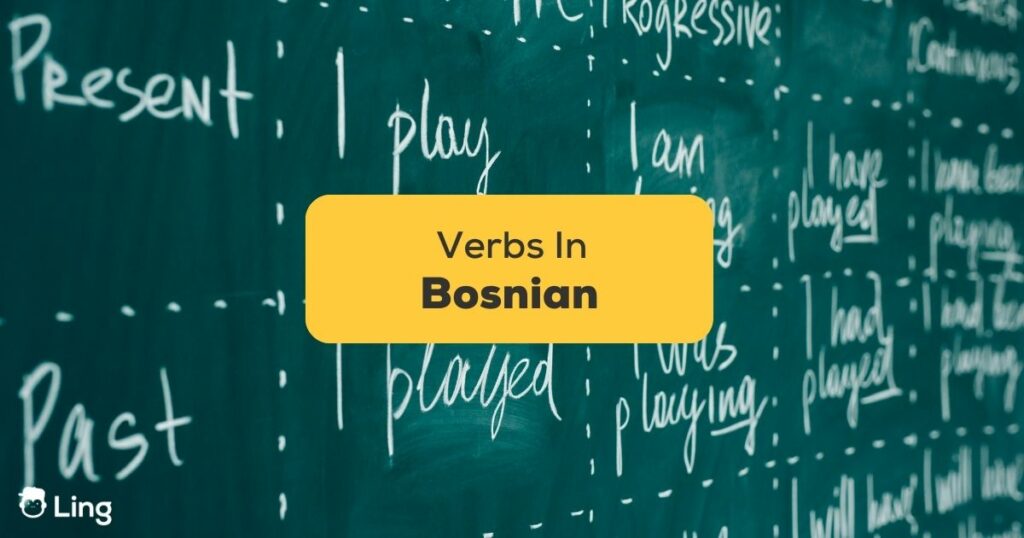The heartbeat of the Bosnian language undoubtedly lies within its verbs. Serving as the catalysts of action, they lay the foundational framework necessary for breathing life into sentences. While sharing certain attributes with other languages, Bosnian verbs are adorned with distinct features, conjugational structures, and nuances. Let’s get to know more about this grammar point in this article! Let’s begin!
What Are Bosnian Verbs?
If you belong to the group of advanced bosnian language learners, then I bet that you are trying to learn grammar. If that is true, then starting with basic verbs is a must! You see, a verb is typically characterized as a word portraying an action, condition, or event. In the realm of the Bosnian language, this pivotal word translates to “glagol.” Parallel to its role in English, the “glagol” is a cornerstone in crafting coherent Bosnian phrases. Just like in many languages, Bosnian too, leans profoundly on the precise employment of its verbs to express actions in the past, present, or future and to indicate the state or condition of something.
Moreover, Bosnian verbs undergo specific alterations in their form based on the subject, quantity, and time frame. This implies that the manifestation of the verb changes or is conjugated depending on the actor (e.g., I, you, they) and the temporal context of the action (e.g., currently, previously, subsequently).
Achieving proficiency in Bosnian “glagoli” (the plural form of “glagol”) paves the way for learners not just in piecing together phrases, but also in immersing deeply into the cultural and societal ethos of places where Bosnian resonates. It’s within these verbs that narratives come alive, commitments materialize, and sentiments find voice. Fundamentally, to unlock the full spectrum of Bosnian linguistic structure and its myriad connotations, the journey commences with the verbs.

Regular VS. Irregular Verbs In Bosnian
Grasping the nuances between regular and irregular verbs stands as a cornerstone in the quest to master Bosnian syntax. Recognizing this demarcation enables learners to anticipate verb transformations, fostering more articulate communication.
Regular Verbs
Referred to as “redoviti glagoli” in Bosnian, regular verbs exhibit a uniform transformation when conjugated. Essentially, once you discern the transformation rule for one regular verb in a given tense, this knowledge typically extends to other verbs of the same category within that tense. This uniformity renders regular verbs an ideal entry point for neophytes.
Take, for instance, the verb “govoriti” (meaning “to speak”), which is categorized as regular. In its present tense, the transformation is as follows:
- Ja govorim (I speak)
- Ti govoriš (You speak)
- On/Ona/Ono govori (He/She/It speaks)
Upon internalizing this pattern, deducing transformations for other regular verbs in the present tense becomes more instinctual.
Irregular Verbs
Labelled “nepravilni glagoli” in Bosnian, irregular verbs, by nature, deviate from the conventional transformation patterns characterizing their regular counterparts. Their unique transformations lack a consistent rhythm, posing a slightly steeper learning curve.
The verb “biti” (translating to “to be”) exemplifies this irregular category in Bosnian. The conjugations in its present tense diverge noticeably:
- Ja sam (I am)
- Ti si (You are)
- On/Ona/Ono je (He/She/It is)
Owing to their inconsistent nature, irregular verbs frequently demand heightened dedication and rote learning.
For Bosnian language learners, discerning whether a verb is regular or irregular is invaluable, as it offers insight into its correct transformation. The repetitive patterns of regular verbs can expedite the learning trajectory, while pinpointing irregular verbs equips learners to allocate additional effort in mastering their unique transformations.

Top 10 Essential Bosnian Verbs
1. Govoriti (To Speak)
“Govoriti” is one of the foundational verbs in Bosnian, primarily used to indicate the act of speaking or conveying information.
- Ja često govorim sa svojim prijateljima. (I often speak with my friends.)
- Ona ne želi govoriti o tome. (She doesn’t want to speak about that.)
2. Biti (To Be)
A cornerstone in many languages, “biti” represents existence, identity, or a particular state.
- Ja sam umoran. (I am tired.)
- Ti si talentiran. (You are talented.)
3. Htjeti (To Want)
Expressing desire or intention, “htjeti” is essential for forming requests or stating preferences.
- Ja hoću kavu. (I want coffee.)
- Ona hoće ići kući. (She wants to go home.)
4. Raditi (To Work)
Whether referring to professional work or general activities, “raditi” is versatile and widely used.
- On radi u školi. (He works in a school.)
- Ti radiš previše. (You work too much.)
5. Vidjeti (To See)
As a primary sense verb, “vidjeti” is integral for expressing observations or acknowledgments.
- Ja vidim pticu. (I see a bird.)
- Možeš li vidjeti zvijezde? (Can you see the stars?)
6. Slušati (To Listen)
Used in contexts ranging from casual conversations to formal instructions, “slušati” signifies the act of attentive hearing.
- Ja slušam muziku. (I listen to music.)
- Slušajte profesora. (Listen to the professor.)
7. Jesti (To Eat)
Central to daily life, “jesti” helps express everything from hunger pangs to culinary adventures.
- Ja jedem sendvič. (I am eating a sandwich.)
- Djeca jedu voće. (The kids eat fruit.)
8. Piti (To Drink)
“Piti” is crucial for discussing beverages, from traditional Bosnian coffee to refreshing water.
- Ona pije vodu. (She drinks water.)
- Volim piti čaj. (I like to drink tea.)
9. Ići (To Go)
Representing movement or progress, “ići” is a verb learners will often encounter in daily conversations.
- Ja idem u školu. (I am going to school.)
- Kada ideš na odmor? (When are you going on vacation?)
10. Znati (To Know)
Expressing knowledge or familiarity, “znati” is fundamental for discussing what one knows or doesn’t know.
- Ja znam odgovor. (I know the answer.)
- On ne zna gdje je. (He doesn’t know where he is.)
Learn Bosnian With Ling!
As you set sail on this captivating voyage through the diverse landscape of the Bosnian language, it’s imperative to remember the dual power of unwavering dedication and having the right tools at your disposal. Though this piece offers a foundational understanding of Bosnian verbs, there exists a vast expanse of vocabulary, syntactical constructs, and cultural depths ready to be delved into.
For those actively seeking the most thorough Bosnian learning tool, the Ling app emerges as a top contender. Crafted with the learner’s experience at its core, Ling not only facilitates language acquisition but also plunges you deep into the heart of Bosnian culture. With Ling as your companion, achieving proficiency in Bosnian transforms into a dynamic and gratifying quest.
Download this now for free from the App Store or Play Store to get started!


































































